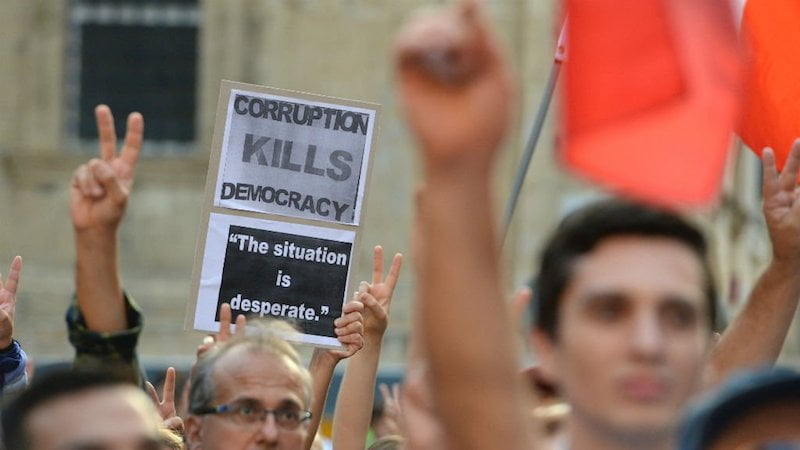Corruption is often deemed unquantifiable but a new report by the Greens in the European Parliament finds that it is costing each Maltese citizen €1,671 every year for every citizen.
This amounts to a hit of over €725 million to the Gross Domestic Product (around 8.65% of GDP). This puts Malta in 12th place in terms of GDP percentage.
The cost of corruption in Malta could give some 42,900 people (over 9% of the population) the average annual wage, according to a report on the costs of corruption in EU Member States published by the Greens/European Free Alliance group.
Overall, around 65% of the size of the entire social expenditure budget in Malta (€1.1 billion) is completely lost to corruption.
Corruption and its costs are often hard to grasp for citizens, who still suffer the consequences of a lack of investment in essential public services, an unfair business environment and an abusive and reckless elite.
EU countries lose €904bln to #corruption p/a! Instead this 💶could be used for:
🍲End world hunger
📖Basic education
💧Universal safe water & sanitation
🚑Universal healthcare
⚡️Universal access to electricity by 2030
New report: https://t.co/F6qyhclogA #UnitedAgainstCorruption pic.twitter.com/wsowyBME5D— Greens/EFA in the EU Parliament 🌍 (@GreensEFA) December 9, 2018
Globally, corruption is costing all EU member states €904 billion each year. This would be enough to end world hunger and help eliminate malaria, the report states.
The damage done by corruption to the GDP of EU member states ranges from 15% in Romania (€38.6 billion) to 0.76% in the Netherlands (€4.4 billion).
Italy breaks the record in absolute terms, losing €236.8 billion each year to corruption. France comes second, losing €120.2 billion each year to corruption, while Germany takes a hit to GDP of over €104 billion every single year.
Using the the most recent data and studies available, the report compares the costs of corruption to public investment in education, healthcare, childcare and housing, elderly care, or policing and fire services.
The cost of corruption in Malta
The €725 million annually lost to corruption in Malta is more than 20 times the budget for the unemployed (€36 million). It is also almost the entire budget for the elderly (€735 million).
This figure is more than 10 times the size of the policing budget (€67 million). The money lost to corruption in Malta is more than 90 times the total amount spent on the fire service (€8 million).
It is over 45 times bigger than the entire housing budget (€16 million), over seven times the national budget for family and children (€102 million), and almost seven times the entire sickness and disability budget (almost €108 million).
Also, Malta loses more money to corruption than the entire amount spent on education (total €510 million).
A 2017 Eurostat survey found that 54% of respondents in Malta believed that the level of corruption had worsened in the preceding three years, while 23% believed the level had remained the same. Only 11% believed the level of corruption had decreased.
Moreover, 79% believe corruption is widespread in the country and 66% believe corruption is part of the business culture of the country.
10% of respondents personally know someone who takes or has taken bribes. 83% of respondents deem corruption unacceptable.
Funding for investigative journalists
To address corruption across Europe, particularly in the spending of EU funds, the Greens/EFA called for more EU funding for investigative journalists and to NGOs that focus on exercising a watchdog function when it comes to the spending of EU funds.
“Investigative journalists who are threatened for their reporting on corruption should be protected as a matter of urgency, and there should be close EU oversight including Europol cooperation in key investigations relating to the safety of journalists.”
The report also called for an annual review of anti-corruption practices in all EU member states and country-specific recommendations on how to better prevent and address corruption.
Among the proposals put forward are the establishment of an anti-corruption index so that countries with higher corruption risks are subjected to more effective and recurrent controls when they spend EU funds.
“Whistleblower protection should be enacted throughout the EU institutions, including the possibility for anonymous reporting. Measures for EU staff to blow the whistle should also be improved,” the report said.
In countries with deficiencies in the rule of law, the report said management of EU funds should not be entrusted to the national authorities but rather be controlled by the relevant EU Commission department.
“There should also be a specific focus on ensuring that high-level corruption cases in individual Member States are adequately dealt with.”
On EU funds, the report said there should be increased transparency over the allocation of funds, including on how projects are selected, the way projects are implemented, on how EU money is spent, and around how EU funding is controlled.












